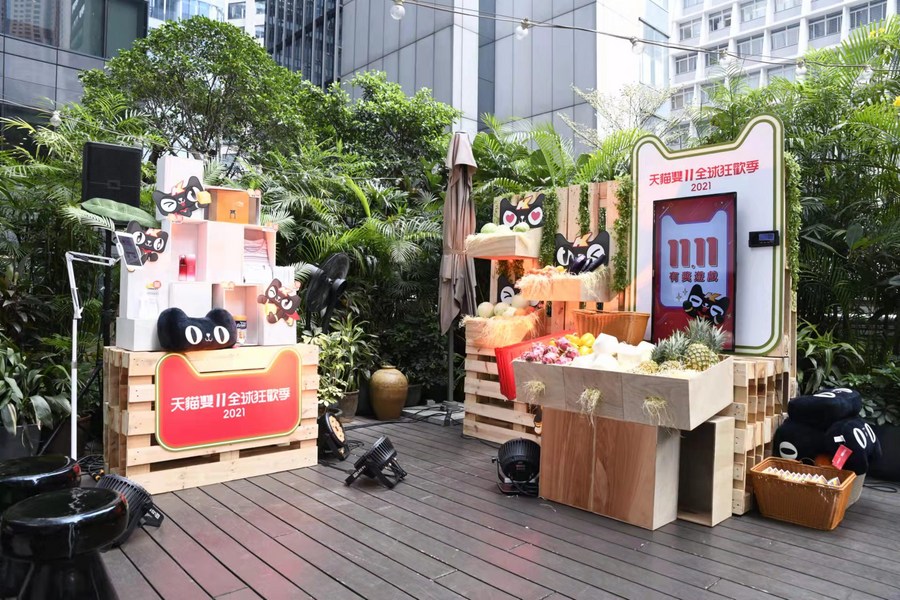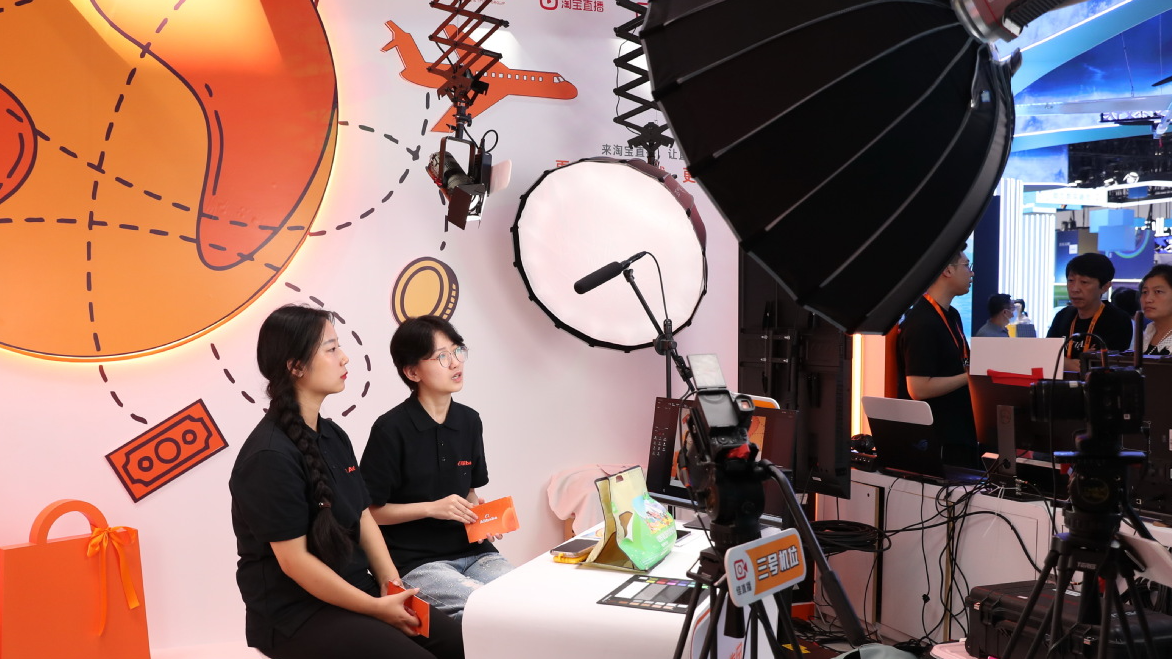A digital wave is throwing a lifeline to Hong Kong’s pandemic-battered retail businesses as they go all out to mimic the success of the Chinese mainland’s e-commerce giants. But experts suggest industry players need to diversify their strategies in the online market amid slowing economic growth and faltering consumption. Zhang Tianyuan reports from Hong Kong.

The lights flickered on, illuminating a face that has become all too familiar with Hong Kong shoppers.
Vivi Chan Shum-yi, a rising star in the city’s burgeoning e-commerce scene, appeared before her vanity mirror, wielding a can of hairspray to perfect her styled locks before the start of a hectic day.
“On some days, I have four livestreaming sessions, each lasting two hours. That means a total of eight hours in the spotlight every day,” says Chan as she pauses, flashing a smile, her eyes twinkling with pride and excitement at her achievements.
The 42-year-old Hong Kong livestreaming sales anchor has, on occasions, raked in seven-figure sums from a single real-time broadcast, although this comes at some expense. “Sometimes I’m so exhausted that I can’t even hear my own voice anymore,” the livestreamer says.
As she responded to questions, Chan reached for a makeup brush, dabbed it in a blush palette and swept it across her cheeks. There was no time for her to rest — in an hour, she would be meeting a potential business partner to discuss a potential collaboration. And in a few hours, the internet influencer would be back online for another two-hour livestreaming on social media platform Meta, promoting Japanese beauty aids and skincare products.
Chan’s thriving businesses exemplify Hong Kong’s burgeoning digital wave. Yet, the special administrative region’s e-commerce sector is still in its infancy compared with that of the Chinese mainland, where online shopping giants have reaped profits of trillions of dollars from livestreaming and Internet sales in the past decade.
According to online data provider Statista, the SAR’s e-commerce revenue reached $4.4 billion last year, and is set to hit $4.8 billion in 2024.
ALSO READ: HK July retail sales slump 11.8% amid shifting habits, strong currency
In the face of dwindling profits and faltering consumption, Hong Kong’s retail sector is pinning its hopes on the booming e-commerce sector to revive flagging sales. Industry insiders have called for increased cooperation between the mainland and the HKSAR in digital commerce. They believe such a partnership, in which Hong Kong could tap into the world’s largest consumption market while serving as a gateway for domestic products to reach global markets, could be a lifeline for both sides to ride out the economic storm.
Hong Kong’s fledgling online shopping market, split between international players and homegrown platforms, offers various options for residents to shell out. Last month’s data from traffic analytics website Similarweb revealed that mainland e-commerce behemoth Taobao topped the list of Hong Kong’s most popular platforms, followed by Singapore’s secondhand marketplace Carousell and US-based Amazon. Two homegrown sites, Price.com and HKTVmall, rounded out the top five.

No more hesitation
“Before the COVID-19 pandemic, local merchants had engaged in online sales primarily to offload inventory or augment their revenue by jumping on the digital bandwagon, rather than as a serious business strategy,” says Joseph Yuen Nim-cho, chairman of the Hong Kong Federation of E-commerce, which represents over 600 corporate members from various sectors, such as retail, digital payment and online shopping software.
The reasons for the city’s hesitant embrace of e-commerce are twofold. In the previous halcyon days, retailers were contented with the steady flow of mainland shoppers splurging on cosmetic products, luxury bags and jewelry at their bricks-and-mortar stores. The deep-pocketed visitors and cross-border purchasing agents provided little incentive for businesses to invest in online sites and sharpen their technology edge.
And, many brands rooted in Hong Kong for over a decade enjoy high brand recognition among residents. Such a strong brand presence diminishes one of the key functions of online shopping platforms — brand explanation and awareness. “Brands like Lancome cosmetics and Friso milk powder had cultivated customer loyalty for two generations through television advertising during the TVB (Television Broadcasts) golden epoch,” says Yuen. “If a person is unsure about buying something, he or she can always ask their mother — she would know.”
During the pandemic, the value of online retail sales saw double-digit growth from HK$20.6 billion ($2.64 billion) in 2020 to HK$34.6 billion in 2022. The share of total retail sales expanded from 6.3 percent to about 10 percent during the same period before dropping back to 8 percent last year.
The HKSAR’s 7.5 million residents offer a limited launch pad for e-commerce innovation versus the mainland — a colossus of the world’s manufacturing prowess touting rock-bottom production costs and an enormous consumer base, which have catalyzed online merchants to devise a battery of sales strategies, like story-driven short videos and livestreaming, to encourage buys.
According to the National Bureau of Statistics of China, the mainland’s e-commerce revenue reached 15.42 trillion yuan ($2.17 trillion) in 2023, with the revenue of online merchandise sales hit 13 trillion yuan.
However, Yuen notes that Hong Kong’s e-commerce advantages lie not in volume, but in the reputation and quality of its brands. “Instead of sealing deals at bargain-basement prices, the city could leverage its status as a superconnector between the mainland and the world in bringing together global brands and unique products,” he says. “And, it could wield the wand of star power that radiates beyond Hong Kong and the mainland to link the fan economy with livestreaming businesses.”
ALSO READ: HK SME biz sentiment improves slightly in July
One piece of anecdotal evidence is Chan’s approach to scouring for undiscovered brands worldwide and introducing them to her fans through live, on-location broadcasts. The social media maven, who has amassed some 20,000 followers on the Meta platform, travels overseas on average at least three times a month to various destinations, such as continental Europe and the Southern Hemisphere.
Her 930-square-meter office, nestled in an industrial building in Kwai Chung, serves as a microcosm of the international retail market, displaying products ranging from handcrafted scented candles from Sri Lanka, eye-catching long dresses from Europe, and supplements and natural remedies sourced from New Zealand, to Hong Kong-made traditional Chinese herbal products.
As an online sales host collaborating with a diverse portfolio of local and foreign brands, Chan is gearing up for a foray into the mainland market as she is upbeat about her curated selections to spur shoppers’ appetites. Her company has set up branches in the key economic hubs of Shanghai and Shenzhen.

Her move came as Hong Kong’s retail sector recorded a five-month losing streak in July, with sales having plunged 11.8 percent year-on-year, and total sales value having shrunk by HK$2.1 billion to HK$29.1 billion between March and July. Most members of the Hong Kong Retail Management Association expect a further downward spiral in the figures for August to be released on Oct 3.
To arrest a decline in profits and boost sales, the long-beleaguered retail industry is now eager to arm itself with digital tools and reach out to mainland consumers.
Following Hong Kong’s July shopping festival where livestreaming was first introduced, the city held its inaugural e-commerce event last month. According to the Hong Kong Trade Development Council, the e-commerce initiative enabled small and medium-sized enterprises to gain practical experience in accessing the mainland market as they advertised and collaborated with mainland influencers in livestreaming through their online shopping platforms and social media feeds, including Tmall, JD, Taobao and Xiaohongshu.
More than 230 brands have so far made trial runs on these platforms and are said to have garnered more than 90 million combined page views across related topic pages and official websites.

Allan Zeman, chairman of Hong Kong’s Lan Kwai Fong Group, struck an upbeat tone, saying he believes that mainland consumers are seeking “quality products from Hong Kong”.
Another promotional drive was the government’s introduction of the “E-commerce Easy” project in mid-July, offering small and medium-sized enterprises up to HK$1 million in subsidies to set up online stores, advertise on third-party platforms, and develop mobile apps, as well as online payment options.
‘A global agent’
However, as Hong Kong retailers make inroads, gray rhinos have emerged on the mainland. Deflated consumption enthusiasm caused by COVID-19, as well as a slowed economy, are exacerbating the woes of the e-commerce sector, which is approaching full saturation in the domestic market. This has ignited price wars and pushed companies to seek new growth opportunities overseas.
A case in point is “Crazy Little Yang Brother” — one of the mainland’s top livestreamers whose sales exceeded 30 billion yuan last year. In August, his company, Three Sheep Group, launched a branch in Hong Kong. Notably, Eric Tsang Chi-wai, a titan of Hong Kong’s entertainment industry and general manager of TVB, was placed in charge of the branch.
According to China Customs data last year, the value of the mainland’s cross-border e-commerce transactions swelled to 2.37 trillion yuan, accounting for 5.7 percent of the country’s total imports and exports value — up 0.8 percentage points from the previous year.
ALSO READ: Cross-boundary e-commerce gives HK brands attractive path to mainland market

The reality, however, is far from rosy. Wang Xin, executive president of the Shenzhen Cross-border E-commerce Association, suggests that Hong Kong leverage its unique position, “along with its informational, capital and language advantages, to act as a global agent for emerging Chinese brands”. These brands have quickly gained ground among young mainland adults in the past few years.
Riding the guo chao wave — a trend that incorporates traditional Chinese style and culture into modern products — Hong Kong could play a pivotal role in introducing these brands to international markets, thereby capitalizing on their domestic success stories on a global stage, says Wang.
Wang met a Hong Kong team led by Chief Executive John Lee Ka-chiu earlier this year to discuss ways of tapping the mainland market through cross-border e-commerce, but advised them to be “cautious”.
“The mainland market, which has seen four decades of economic dividends, is now approaching saturation. The current situation makes external brands hard to capture the mainland market. They would need to invest a lot of money without guaranteed returns or profits,” warns Wang.
She notes that unlike the past when mainland consumers were mad about foreign luxury goods, “Made-in-China” products have now largely replaced imported commodities, and holders of HKSAR passports can enjoy visa-free access or visa-on-arrival privileges in over 170 countries and territories, which is “a great advantage in conducting international business”.
Yuen believes that successful livestreaming e-commerce hinges on three fundamentals — a robust financial system, an efficient logistics network, and a vibrant influencer culture. Hong Kong, fortunately, excels in all these areas.
He is confident the city could punch above its weight to be a hub for cross-border e-commerce by leveraging these factors and helping mainland brands to conquer world markets.
Contact the writer at tianyuanzhang@chinadailyhk.com


